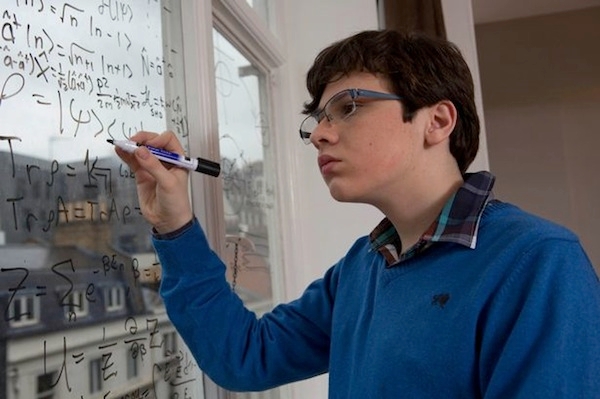Jacob Barnett is a youthful prodigy. His IQ tested off the scale. At nine he began work on an original theory in astrophysics; aged 12 he became a paid academic researcher. He can play complicated musical pieces or learn foreign languages almost instantly and without tuition. As one researcher puts it, ‘Jake’s working memory is a piece of paper the size of a football field.’
Jacob’s mother, Kristine, comes from an Amish family — ‘not horse-and-buggy Amish, but city Amish’; her faith has directed her along the path she has taken with her extraordinary son. (It would be interesting to know the religious views of the young quantum physicist, but we’re not told.) Though she and her husband are college-educated, and unusual talents have cropped up in the family — Grandpa John was an eccentric inventor, Kristine’s sister was a precocious artist — there was little to prepare them for the reality of raising Jacob. They live in ‘working-class’ small-town Indiana. ‘We were an ordinary family and Jake was an ordinary baby,’ says Kristine, though the fact that at ten months Jacob had memorised the Spanish and Japanese as well as the English version of his favourite DVDs may strike readers as outside the ordinary.
At 14 months, Jacob seemed to lose skills and to retreat into a world of his own — a classic autistic regression. A lifetime of ‘special ed’ seemed to lie in store, but Kristine rebelled, and devoted herself to fanning the ‘spark’ which she believed still burned inside her son. She didn’t hothouse him; instead she tried to find ways of stimulating his interests while providing him with the wholesome all-American childhood (popcorn, ball games, campfires, church) in which she fervently believes.
Kristine’s second baby was seriously ill; she herself has lupus syndrome.The family was badly hit by the recession; Jacob’s one close friend was killed. Despite the incredible catalogue of disasters, Kristine runs a day nursery, has set up a charitable community centre for autistic children and their families, and has succeeded in enabling Jacob to manage his autism to the point where his genius can find full expression.
‘Autism is a thief. It takes your child away,’ writes Kristine,who certainly regards herself as having vanquished the thief. (It has to be said that she is not averse to having a little tootle on her own trumpet.) She is an admirable woman, Jacob is a remarkable boy and their story deserves to be told.
But, as the mother of two autistic sons not yet in the frame for Nobel prizes, I feel a little uneasy. One could put the book down with the impression that autism can be conquered by the right kind of nurturing; that with sufficient parental effort all our little sparks could flare into gemlike flames.
This is misleading, and disheartening. One can never, in any case, be certain of what affects the outcome; it’s quite likely that a mind like Jacob’s would have shaken off its shackles under any conditions. Kristine fights to get him out of special ed and into mainstream; but in truth he is hardly more suited to that environment. And while I believe that most autistic people have more ability than they are able or willing to reveal, it cannot be stressed too strongly that the savant skills so attractive to the general public only occur in a tiny minority of cases. The Spark is a fascinating account of one highly unusual family, but it is not a full depiction of autism.






Comments